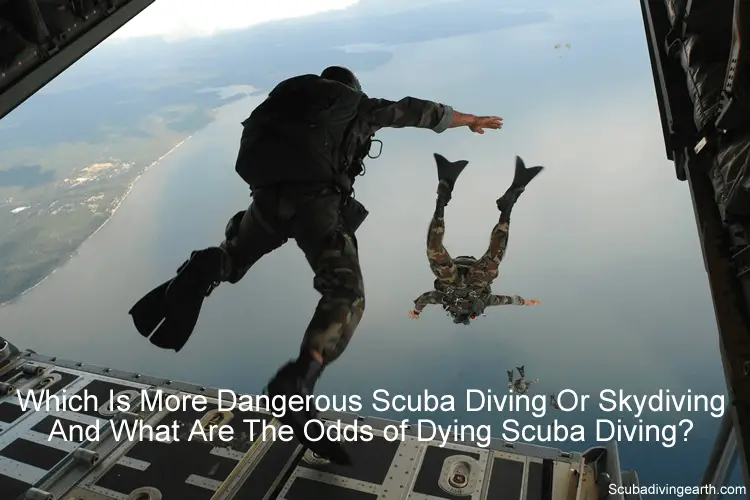
Which is more dangerous scuba diving or skydiving and what are the odds of dying scuba diving?
If you’re considering scuba diving or skydiving, you may be wondering which is safer. What are odds of dying with each of these sports?
The question: ‘Is scuba diving more dangerous than skydiving;’ the answer statistically speaking yes. Skydiving is statistically safer than scuba diving. The odds of dying scuba diving are nearly three times that of the odds of dying skydiving. But the odds of dying whilst driving in a car on the way to scuba dive or skydive are far worse. In fact you’re more than five times more likely to die in a car crash than you are scuba diving.
The best way to do more diving is to book yourself on a scuba diving liveaboard. You can check the latest and best deals on liveaboards using the following window:
As an aside, in this article about where to find great white sharks, you may be as surprised as I was to discover some of the places where you find great white sharks! Place number 6 is the one that surprised me the most, but if you live in the States, you may be more surprised at places two, three and four.
Which is safer, scuba diving or skydiving?
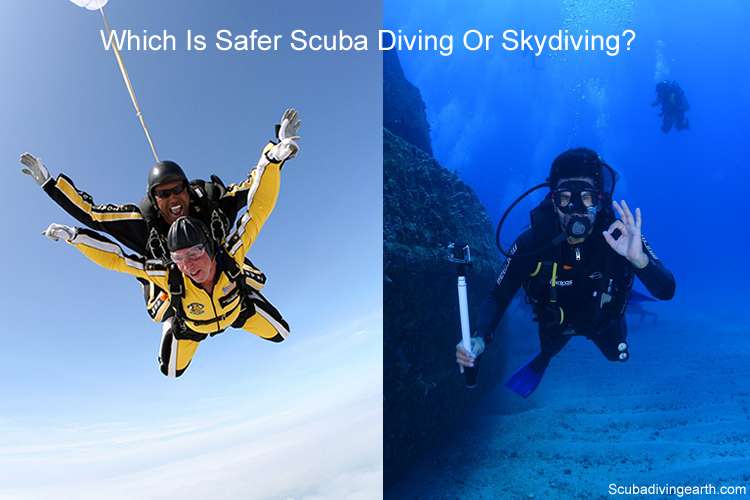
Let’s take a look at the safety record for both these sports in turn. Although this website is about scuba diving, let’s first take a look at skydiving safety.
How safe is skydiving?
Is skydiving totally safe? No it’s not, as there’s no such thing as a totally safe parachute jump.
The risk is very low these days, but there’s always some risk. Sport parachuting can never be entirely risk-free. But how dangerous is skydiving exactly?
The risk in parachute jumping is measured as injuries per 1,000 jumps. But for fatalities this is measured as fatalities per 100,000. Injuries can range from minor cuts and bruises through to fractures, sprains and internal injuries. The good news is that most injuries reported for skydivers are minor.
As reported on the British Parachute Associate (BPA) website, as per the link above, the injury rate is about 1 injury/1100 jumps. Interestingly the injuries vary by gender, with 1/900 for women and 1/1500 for men.

Skydiving fatalities
- Tandem jump skydive – The injury rate is about 1 injury/1100 jumps. The fatality rate since 1988 is about 0.14 per 100,000 jumps. This is equivalent to 1 fatality in 703,000 tandem jumps.
- Static line jump skydive – The novice rate is just under 5/1000 jumps or about 1 injury per 220 jumps. The fatality rate may be about 3/100,000 jumps or 1 fatality in 33,000.
- Experienced skydivers – Injury rate of 1/1000 jumps and a fatality rate of 5/100,000 jumps.
The BPA says: You want NO risk at all; If Skydiving is NOT for you Do NOT enrol on any type of parachute course.
How safe is scuba diving?
You are nearly three times more likely to die scuba diving than you are skydiving. That means you must follow safe diving practices to stay safe. You must always dive in buddy pairs and never go beyond your experience limits.
Let’s ask the same question: ‘Is scuba diving totally safe?’ No it’s not, as like with skydiving, things can and do go wrong.
There’s no such thing as a totally safe scuba dive. After all you’re breathing air from an aqualung in a foreign environment. You could have an equipment failure or you may make a mistake and run out of air.
Either way, if you run out of air, you have a problem when you’re underwater. However, if you follow safe diving practice, you’ll be scuba diving with a buddy. Plus your buddy will have an alternative air source for you to breath safely to the surface. Plus I will add, if you’re taught correctly and you check your air on a regular basis, you should never run out of air.
More Reading: How do I get a dive buddy? (5 easy ways to find a dive buddy)
Additionally, you should always aim to be on the surface with your reserve air (50 Bar). You shouldn’t be leaving the bottom with just your reserved air left.
When I was researching this article to discover similar statistics for scuba diver fatalities to those for skydiving, I came across this great resource.
If you follow this link, which is about ‘Your Chances of Dying,’ by Best Health Degrees, you’ll see your chance of dying on many activities. And not just for scuba diving and skydiving (see below too).
You can also take a look at the NCBI website, which looks at the ‘DAN Annual Diving Report 2017 Edition: A Report on 2015 Diving Fatalities, Injuries, and Incidents.’
What are the odds of dying while scuba diving?
The odds on the above described website, where the information is demonstrated in a great graphic if you’re interested, is 1 in 34,400 die each year scuba diving.
In comparison, which is less than the average of the figures above from the British Parachute Association, they say 1 in 101,083 die skydiving.
So to answer the question of ‘Is scuba diving more dangerous than skydiving,’ it would appear that scuba diving is more dangerous than skydiving.
In fact, you’re nearly three times more likely to die scuba diving than skydiving based upon the statistics from the above article.
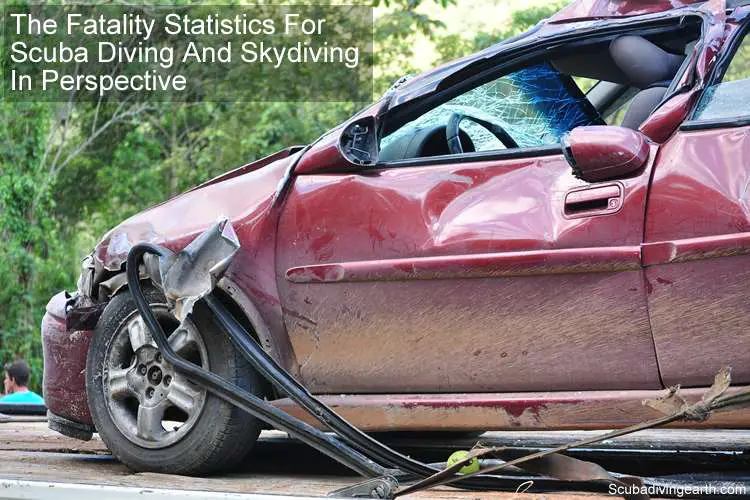
Putting the fatality statistics for scuba diving and skydiving in perspective
You’re over five times more likely to die in a car crash on your way to scuba diving than you are doing the dive itself. So in reality scuba diving is a safe sport when viewed in comparison to road travel fatalities.
As a comparison and looking at some of the other fatality rates for other sports on the ‘Your Chances of Dying‘ page linked-to above, you’ll see that canoeing is even more risky that scuba diving at 1 in 10,000 fatalities. Mountain hiking is 1 in 15,700 and hand gliding is 1 in 560, which are also more risky than scuba and skydiving.
But to put this all into perspective, the fatality rates using car transportation is 1 in 6,700. So driving a car is way more risky than scuba diving.
Driving is also way more risky than canoeing, mountain hiking and hand gliding also. That means you are more likely to get killed on the way to any of these sports than you will get killed doing them.
What’s the moral of the story with regards to the dangers of scuba diving vs skydiving
To conclude, the moral of this story (or of this article) you are much safer scuba diving underwater or jumping out of a plane than you are driving along a road.
If you make sure you train with a reputable organisation and practice safe scuba diving, plus safe skydiving for that matter, you are better to enjoy yourself and go for it.
But be very careful on the roads on your way to wherever and whatever recreational sport you do.
Finally ask the question ‘Should I take up skydiving or scuba diving?’

If you’ve read this article and your question is ‘Should I take up skydiving or scuba diving,’ I can’t really help you as far as skydiving is concerned, as it’s not something I’ve ever done. So although on paper scuba diving is more dangerous than skydiving, I can confirm that it’s a great recreational sport to enjoy.
Depending on whether you love wildlife, or perhaps you like the idea of scuba diving on a wreck or two, scuba diving appeals to a wide audience. There’s so much to explore in the oceans:
From the Great Barrier Reef, to the Rowley Shoals in Australia, then from diving amongst seals in the Farne Islands to the wrecks of Scapa Flow in the UK. Then there’s diving with tiger sharks of Tiger Beach Bahamas to swiming with the largest fish in the oceans the whale shark in many places around the world.
If you’re looking to begin scuba diving, take a look at some of the best places to scuba dive for beginners. You have so much choice and it’s a great sport to meet other like minded people.
So whilst there’s a higher probability of a fatality when scuba diving, this statistic is still very low.
Not wishing to leave skydiving out of this part of the article, this is another exciting sport. But I don’t profess to know enough about it to comment. But you can quite easily get yourself on to your first skydive at your local skydiving club.
More Reading: What should you not do after scuba diving (11 must NOT do’s after diving)
Please don’t forget to take a look at this article about where to find great white sharks, you may be as surprised as I was to discover some of the places where you find great white sharks! Place number 6 is the one that surprised me the most, but if you live in the States, you may be more surprised at places two, three and four.
I hope you enjoyed this article about is scuba diving more dangerous than skydiving
I’d love to hear from you. Tell us about your adventures of scuba diving or skydiving, in the comments below. Please also share your photos. Either from your underwater cameras or videos from your waterproof Gopro’s!
If this article hasn’t answered all of your questions. If you have more questions either about snorkeling or scuba diving (or specifically about is scuba diving more dangerous than skydiving), please comment below with your questions. Please don’t ask too many skydiving questions though!
There will also be many more articles about scuba diving (and snorkeling) for you to read and learn about these fabulous sports.
Have fun and be safe!



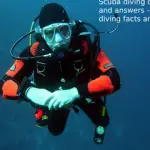
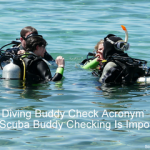
Of the fatalities scuba diving ,are the majority of from running out of air , equipment failure, animal attacks or boat accidents?
Hello James, thank you for your question. It appears from data collected from the Divers Alert Network (DAN) that the main ‘trigger’ for diving fatalities is either an underlying health problem or air management. Deaths that have been put down to an ‘air management’ trigger may be health related and may not have occurred on dry land for example.
For the DAN report compiled for 2017, health problems caused 15% of deaths and 6% was running out of air. But of the total 67 fatalities in the 2017 report, 49% of the triggers are unknown.
Between 2010 and 2013 of the total deaths in this period 197 of the triggers is unknown or 61%, health problems 19 or 5.9% and breathing gas management 18 or 5.5%. On this report they note just one marine life attack out of the total 323 fatalities.
If you look back to the DAN Vol 35 No. 6 report of Common causes of open-circuit recreational diving fatalities (see link below), 41% of triggers associated with diving deaths was insufficient gas and 20% entrapment of a total of 947 open-circuit diving fatalities.
You may wish to read this pdf put together by DAN, which is the 2017 version of events, which is for the US and Canada and not the world as a whole. The table of triggers for the known 34 diver fatalities is on page 23 of this pdf report: https://www.diversalertnetwork.org/medical/report/AnnualDivingReport-2017Edition.pdf
Link to Vol 35 No. 6 https://www.diversalertnetwork.org/files/DivingFatalityCauses.pdf
Confused by the 1 in 6700 car fatality rate. The way your article describes it (you are more likely to die driving to a dive than in the dive) it seems like 1 in 6700 drives results in a fatality. If you think of how many people drive in a large city per day… The amount of deaths every day would be staggering.
Or to consider a different angle I know many many people who have driven to work their entire working lives. Like let’s consider what that means. That means they drove 5 times a week (and had 10 trips per week). This doesn’t include basic chores, going to leisure or sports activities, etc. We are just talking about work. That is 500 car trips per year. By 14 years they’ve made 7000 car trips. But one in 6700 trips results in fatality? The average person who drives to work for 20 years should be dead then let alone longer. Basically the statistic seems like complete garbage.
What I would guess the real statistic is (if it is is real) is that 1/6700 is your chance of dying in a year as a driver. And your article compares that chance to the odds of a registered diver dying in a year. Now what rate do you think a registered diver dies at? Many masters proudly advertise that they have 1000 dives. +3000 dives would be a tiny fraction of the population. I’ve been registered for 7 years and have under 30. Meanwhile the average commuter racks up +500 drives per year reaching as many exposures as most master divers within two years. It wouldn’t surprise me if one third of my city has over 3000 instances of driving – a number that would be staggering from a diver perspective.
This last bit is spitballing numbers but you might be comparing an average driver doing say 300 trips a year (brought down from +500 by mainly pleasure drivers but this is likely an underestimate given 20000km average milage) to an average registered diver being happy to get to do 10 in a year. Then concluding that because a higher fraction of drivers died each instance of driving is more dangerous than an individual dive.
Sorry to rant but I hate when people misuse statistics like this.
Hello DAS, thank you for your comment and don’t apologise for the rant, as I love it when people engage with my writing. This means that people, like yourself, are reading what I have to say, which I love. To confirm, the site I got this statistic from quotes it as 1 in 6,700 cars as the risk of dying in a car accident, which was taken from Harvard School of Public Health.
I have just gone on to this site here https://www.asirt.org/safe-travel/road-safety-facts/ and they claim that there are 1.25 million people that die in road crashes each year, which is on average 3,287 deaths per day. Which is quite staggering! There also an additional 20-50 million are injured or disabled, which is quite a frightening statistic. However, if you’re over the age of 44 your risk reduces significantly too, but also that road traffic crashes rank as the 9th leading cause of death and account for 2.2% of all deaths globally.
But on this article here: https://en.wikipedia.org/wiki/List_of_countries_by_traffic-related_death_rate – the annual deaths has increased to 1,350,000, with the Western Pacific accounting for the highest in numbers.
On this site https://www.autonetinsurance.co.uk/infographic/drivingdangers/, which is about UK drivers only, 2,538 die each year on average and your chance of being killed is 1 in 200, which is even higher than the odds I mention and you’ve challenged in my article.
One further reference, to add more confusion to this statistic is here: https://www.iii.org/fact-statistic/facts-statistics-mortality-risk, in this article they claim: The lifetime chances of dying from accidental drug poisoning were one in 68 in 2017, compared with one in 572 in a car accident and one in 218,106 for fatal injuries caused by lightning.
Exact same thoughts. This article shows a lack of understanding of statistics
Hi Tyler, thank you got this comment too. I need to re look at the stats!
I find it interesting that skydiving is safer than scuba diving. I’ve certainly never felt safer when I was sky diving, while I’ve always felt perfectly safe while scuba diving. And these days, most of my scuba diving is solo diving. I prefer to dive by myself so I can pay more attention to the surroundings nature’s provided over that of having to watch out for another diver. As for my own safety, I’m a firm believer in using the best possible gear I can afford, complete with backups. I have a spare air source that’s built into my dive kit. My entire setup has been custom built specifically for me, even down to the exact length of each hose. I can switch between my primary and alternate air source with the flip of a lever, as both feed an air bloc which in turn, feeds my full face mask…itself being far safer than just a mask and regulator. I also use a drysuit, thus, have a secondary means of controlling my buoyancy. I’m also very conscious about the amount of air I have at any given time. When diving with a buddy, I’ve often had to end a dive short because of my buddy’s air consumption. Lastly, I never go diving in any enclosed space that can prevent me from reaching the surface when I’m by myself. That includes limiting my depth, because if you run out of air at the 130 foot mark, you might as well be cave diving. 130 feet is a really long ways to go when you can’t breathe.
Hello Jeffrey, thank you for your comments and interesting to read. I can’t comment fully on skydiving and feeling safe or not, as I’ve never done a sky dive, but my wife has and she assures me it’s really exciting!
You are absolutely right about safe diving with backups etc and like yourself, I’d never do a cave dive. I also limit my depths these days to less than 30 metres (100 feet) myself – gone are my days of deep dives and decompression diving.
I did however pick up on your comment about when you’re by yourself: ” I never go diving in any enclosed space that can prevent me from reaching the surface when I’m by myself”, I am hoping you don’t mean actually diving on your own here, as this isn’t safe diving practice.
Anyway, happy and safe diving and happy skydiving!!
When something goes wrong scuba diving, you usually have a bit more time to mitigate the outcome. Not so with skydiving.
Hi Tyler, thank you for your comment and engagement. That does depend on what’s gone wrong, if you run out of air for example, and you only usually find this out when you’ve just breathed out so in need to breathe in, you don’t have a whole lot of time. Unless of course you’re good at holding your breath!
The next problem is what the distance your buddy is away from you at the time you run out of air to get to their spare air.
Good point though, as I imagine that if your parachute doesn’t open you don’t have a whole lot of time to correct the problem!!
yea I love sharks
Hi JJ – me too!! Thank you for the comment 🙂
1 in 34,400 die each year scuba diving
1 in 101,083 die skydiving.
These are not comparable statements. I have not checked the sources, so it is not clear whether the actual statistics are comparable.
If you want to quote statistics and remain credible you need to make sure you quote the conditions accurately.
I am assuming that this is unintentional and you are not deliberately misrepresenting the stats.
In the first statement a period of a year is specified. no indication is given on the average number of dives per year per diver. It is probably more than 1.
In the second statement, no period is mentioned. If this is per jump, the annual rate is going to be worse.
If it is per skydiver over their entire jumping career the annual rate is going to be better.
On these two statements it is not possible to say whether scuba or skydiving has a higher fatality risk.
Hello Peter, firstly thank you for your comments on my blog – always appreciated.
As you say, for me I’m certainly not deliberately misrepresenting the stats if that’s what has happened here.
This is a quick response for now, but will post a fuller response when I reviewed further what you’re saying about the statistics – although this was never my strong point at school I have to say!!
By the way, are you a scuba diver or a skydiver or both?
Cheers, Russell
The source https://www.besthealthdegrees.com/health-risks/ states that Scuba diving Mortality rate: 0.0029 (/100 participants)
and the odds of dying while skydiving in the United States is 1 in 101,083 jumps
Unless otherwise clarified, it is reasonable to interpret the diving mortality rate as independent of number of dives per participant, while the skydiving rate is independent of number of participants, making these two rates strictly non- comparable.
I could not verify the 1 in 34,400 die each year scuba diving from the DAN Annual Diving Report 2017 Edition. Where is it stated?
If it is correct, the risk would be the same if the divers averaged 2.94 dives per year, which is not a large number. If the divers averaged 3 dives per year, the risk of death during a scuba dive would be lower than the risk during a skydive.
Hi Peter – also thank you for this comment too, see my response above – I will look into this further too.
Scuba diver since 1983. I have jumped out of a functioning aircraft twice, but never got into it.
You have to be very careful when comparing statistics. It is easy to come to invalid conclusions when comparing results based on different data sets that were analysed by different methods.
Cheers
Hello Peter – you’ve been diving for a little longer than me then!! Myself, I’ve never done a skydive as it’s not really my thing, but my wife has and would do it again, as she loved it!
Noted re the statistics, as you know what they say about stats and lies!! 🙂
Thank you for the interaction, very much appreciated and happy diving!!